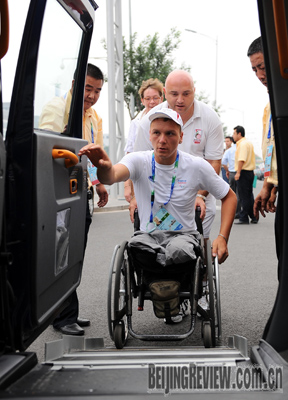| 
GETTING AROUND: A French Paralympic athlete in Beijing prepares to take
a ride in a taxi that can accommodate passengers in wheelchairs
The Beijing Paralympic Games, which thousands of disabled athletes worldwide attended in a celebration of the spirit of competition and courage, will bring more positive changes to the lives of China's disabled population.
More than 4,000 athletes from 148 countries and regions participated in the Paralympics, demonstrating their strength, courage and pursuit of athletic excellence.
"The Games will be a stage for the disabled athletes to challenge their own limits," said Wang Wei, Executive Vice President of the Beijing Organizing Committee for the Games of the XXIX Olympiad (BOCOG), at a news conference in Beijing before the Paralympics got underway. "It will also be a catalyst for improvement in the cause of the disabled people in China and the world."
Much attention had been paid to the disabled long before the Paralympics started on September 6. Television stations broadcasted the stories of Paralympians and films featuring disabled people during prime viewing hours.
Beijing had invested 600 million yuan ($88 million) to install and improve accessibility facilities for the Paralympics. It also purchased public buses with doors that could be lowered and installed public toilets with assistance devices and warning systems on the streets. Rules prohibiting large dogs were relaxed so that the blind could take their guide dogs with them in the sports venues and other public places in the capital.
Parks, museums and tourist sites, including the Forbidden City and the Great Wall, added obstacle-free facilities for the disabled, as did all the country's airports. Banks and post offices in some cities provided services in sign language.
More than 5,000 disabled residents in Beijing were recruited as community supervisors to check whether accessibility facilities were acceptable. In Qingdao, one of the co-host cities of the Olympics and Paralympics, more than 20,000 local residents registered to learn some sign language to communicate with people with hearing impairment. More than 162 Chinese middle schools were paired up with Paralympic committees in 159 countries and regions in educational programs. Meanwhile, the Paralympic torch relay, which was routed through 11 cities across the country, delivered a message of transcendence, integration and equality for the Games.
Legal base
China has a disabled population of 83 million, who require a favorable social environment to help them participate fully in and integrate into society at large. In order to protect their rights, the government enacted the country's first Law on the Protection of the Handicapped in 1990. So far, there have been more than 50 sets of laws and regulation concerning the rights of and benefits for the disabled.
| 